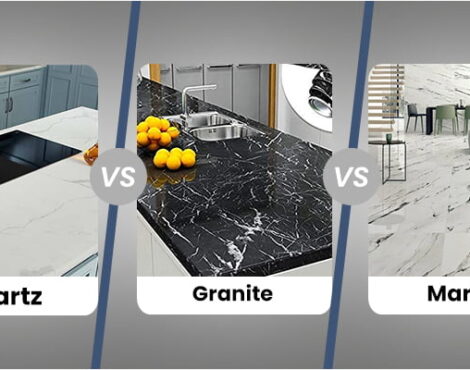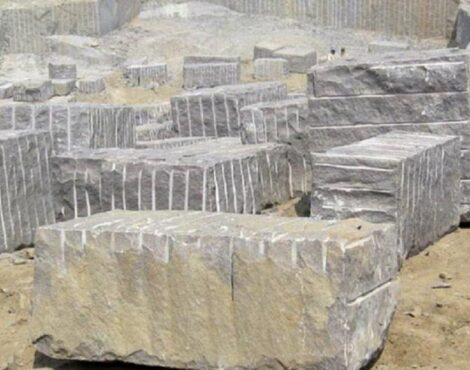Flooring, paving, cladding, and landscaping are just some of the many uses of granite and other natural stones. The quality of granite, however, can vary widely depending on a number of factors such as the specific stone used, its origin, and the method of production. In order to guarantee the quality of finished natural stone products, granite testing or any natural stone testing is essential. Manufacturers and end user can determine if natural stones have the required physical, mechanical, and chemical properties for a given application by putting them through a battery of tests.
What are Tests for Granites & Other Natural Stones?
Tests for granites and other natural stones are crucial to ensure their quality, durability, and suitability for various applications. Here are some common tests conducted on granites and other natural stones:
Water Absorption Test:
- Measures the amount of water absorbed by the stone, indicating its porosity and susceptibility to staining.
Density and Porosity Test:
- Determines the density and porosity of the stone, influencing its strength, durability, and resistance to weathering.
Compressive Strength Test:
- Measures the ability of the stone to withstand axial loads, indicating its overall strength and suitability for load-bearing applications.
Flexural Strength Test:
- Evaluates the stone’s resistance to bending stresses, crucial for applications like flooring and cladding.
Abrasion Resistance Test:
- Determines the stone’s ability to resist wear and tear due to foot traffic or abrasive materials.
Impact Resistance Test:
- Assesses the stone’s ability to withstand impact forces, relevant for areas prone to impact or heavy use.
Chemical Resistance Test:
- Determines the stone’s resistance to chemical agents, important for countertops and surfaces exposed to potentially corrosive substances.
Slip Resistance Test:
- Measures the stone’s slip resistance, crucial for flooring applications to ensure safety.
Weathering Test:
- Simulates natural weathering conditions to assess the stone’s durability over time.
Petrographic Analysis:
- Examines the stone’s mineral composition and structure, providing insights into its geological characteristics.
Dimensional Stability Test:
- Ensures that the stone maintains its shape and dimensions under different environmental conditions.
These tests are conducted following international standards set by organizations such as ASTM (American Society for Testing and Materials), EN (European Norms), and IS (Indian Standards). Regular testing helps in maintaining quality control in the production and application of natural stones like granite.

What Are Benefits Of Granite Testing?
The benefits of granite testing are significant and contribute to ensuring the quality, durability, and reliability of granite products. Some key advantages include:
Quality Assurance: Granite testing verifies the material’s quality, ensuring it meets predetermined standards and specifications.
Durability Verification: Testing assesses the durability and strength of granite, providing assurance of its ability to withstand various environmental conditions and usage.
Consumer Confidence: Certified and tested granite instills confidence in consumers, assuring them of a reliable and high-quality product.
Compliance with Standards: Testing ensures that granite products comply with industry and regulatory standards, avoiding legal issues and ensuring market acceptance.
Risk Mitigation: By identifying potential defects or issues early in the testing phase, manufacturers can mitigate risks and prevent costly problems post-installation.
Long-Term Savings: Upfront testing costs can lead to long-term savings by preventing the need for replacements or repairs due to substandard granite.
Market Competitiveness: Manufacturers with tested granite can differentiate their products in the market, gaining a competitive edge and attracting discerning customers.
Environmental Sustainability: Some tests may assess the environmental impact of granite production, helping manufacturers adopt more sustainable practices.
Overall, granite testing is a crucial step in ensuring the performance and reliability of granite products, benefiting both manufacturers and consumers alike.

Most Ignore Grantie Testing. Why?
Several reasons contribute to why some people may avoid granite testing:
Cost Concerns: Granite testing can involve additional costs, and some individuals or businesses may perceive it as an added expense, especially if they are operating on a tight budget.
Time Constraints: Testing processes can take time, and individuals or businesses working on tight schedules may prioritize speed over thorough testing, assuming that all granite is relatively similar in quality.
Reliance on Supplier Claims: Some buyers may rely solely on the claims of granite suppliers or manufacturers without independently verifying the quality through testing.
Trust in Established Brands: Those purchasing granite from well-established and reputable brands may trust the brand’s reputation and quality control processes, leading them to skip independent testing.
- Small-Scale Projects: Individuals undertaking small-scale projects, such as home renovations, may perceive testing as unnecessary for their specific needs.
Perceived Complexity: The perceived complexity of testing processes, especially for those without technical expertise, may deter individuals from initiating the testing procedures.
- Limited Awareness: The lack of awareness about the benefits of granite testing and the availability of testing agencies contribute significantly to individuals overlooking or dismissing the importance of such testing.
Granite Testing and Inspection Agencies
There are several internationally recognised organisations perform inspections and certifications of natural stones. Here are a few illustrations:
ASTM International
ASTM International is widely recognized for developing and publishing technical standards that cover a diverse range of materials, including granite. Their standards help ensure the quality, safety, and performance of various products, contributing to industry consistency and reliability.
European Committee for Standardisation (CEN)
CEN develops and publishes European standards, providing a framework for quality and safety in various industries, including construction materials like natural stones. Their standards contribute to harmonizing practices and ensuring the reliability of products across European countries.
National Institute of Standards and Technology (NIST)
NIST‘s activities encompass a wide range of industries and sectors, including materials and measurements. While it may not focus solely on natural stones like granite, its work influences standards and practices in related areas.
Bureau Veritas, a global leader in inspection, certification, and testing services, ensures the quality and compliance of natural stone and granite products (Bureau Veritas). Intertek, a multinational company, specializes in testing and evaluating natural stones to meet international standards (Intertek). SGS (Société Générale de Surveillance), a Swiss-based company, is globally recognized for its expertise in verifying the quality of natural stones, including granite (SGS). TÜV SÜD, a German testing and certification company, plays a crucial role in ensuring the standards of natural stone and granite products (TÜV SÜD). Eurofins, an international group of laboratories, provides comprehensive testing solutions for natural stones and granite (Eurofins). Element Materials Technology, a global provider of testing services, contributes to ensuring the quality and safety of natural stone and granite (Element Materials Technology). UL (Underwriters Laboratories), a global safety science company, verifies the safety and compliance of natural stone and granite products (UL).
These are just a few of the internationally recognised labs that test stones to ensure their quality with a presence in India that offers testing services for natural stones. There are also a number of other Indian organisations that test natural stones, including:
When selecting a granite testing agency, several factors should be considered to ensure the reliability and accuracy of the testing results. Here are key factors to keep in mind:
Accreditation and Certification:
Choose an agency that is accredited and certified by relevant accreditation bodies. Accreditation ensures that the agency follows recognized standards and procedures.
Grantie Testing Expertise and Experience:
Assess the agency’s expertise in natural stone testing and their experience in the industry. A well-established agency with experienced personnel is likely to provide more reliable results.
Granite Testing Facilities and Equipment:
Verify the testing facilities and equipment used by the agency. State-of-the-art equipment and well-equipped laboratories contribute to the accuracy of the testing process.
Comprehensive Granite Testing Services:
Ensure that the agency offers a comprehensive range of testing services relevant to granite, including tests for physical properties, chemical composition, and performance under various conditions.
International Standards Compliance:
Check whether the agency follows and complies with international standards such as those set by ASTM, CEN, or other relevant organizations. Compliance ensures the results’ consistency and reliability.
Turnaround Time:
Consider the agency’s turnaround time for delivering test results. Timely reporting is crucial, especially in projects with tight schedules.
Customer Reviews and Reputation:
Research customer reviews and testimonials to gauge the agency’s reputation. Positive reviews indicate the agency’s reliability and customer satisfaction.
Cost of Granite Testing:
Evaluate the cost of testing services. While cost is a consideration, it should be balanced with the agency’s reputation, expertise, and the comprehensiveness of their testing services.
Communication and Customer Support:
Assess the agency’s communication practices and customer support. Clear communication and responsive customer support contribute to a smoother testing process.
Accreditation Bodies Recognized in the Industry:
Check whether the agency is recognized by industry-specific accreditation bodies, as this adds another layer of credibility to their testing processes.
Geographical Coverage:
Consider whether the agency has a presence or partnerships in the geographical regions relevant to your project. Local presence can facilitate easier coordination.
By considering these factors, you can make an informed decision when selecting a granite testing agency, ensuring that the testing process aligns with industry standards and project requirements.

Which Indian Agencies Specialize In Granite Testing?
In India, several agencies specialize in granite testing, ensuring the quality, durability, and compliance of the stone with relevant standards. These include the National Council for Cement and Building Materials (NCCBM), National Test House (NTH), Indian Institute of Technology (IIT) laboratories, and the Geological Survey of India (GSI). These organizations conduct various tests to assess the suitability of granite for construction purposes.
Specifically, government-owned laboratories like the National Test House (NTH) and the Central Building Research Institute (CBRI) are prominent players in providing testing services for a range of materials, including natural stones like granite. Their affiliation with the government adds credibility to their testing and certification services, making them reliable choices for those seeking granite testing services in India.
These are just a few examples of the organisations in India that test natural stones. To guarantee the accuracy and dependability of the results, it’s critical to select a reputable and accredited testing organisation.
Conclusion
In conclusion, granite testing is not without its drawbacks and expenses, but it does offer significant benefits to both natural stone producers and natural stone buyers. Stakeholders are able to make educated decisions about when and how to test natural stone if they have a solid understanding of the different types of tests that are available, as well as the benefits and drawbacks of each test and the associated costs.
Stone Galleria
Expect more than just materials from us – expect a partnership built on reliability and responsiveness. We understand the unique needs of the Commercial enterprises, and We are dedicated to providing reliable and cost-effective supply chain management.
Stone Galleria is a leading and prominent manufacturer, supplier, and exporter of Granite, Sandstone and quartzite, which can be manufactured and processed to your specifications for dimension, thickness, and multiple finishes.
Take the first step toward transforming your operations by requesting a free quote today. Simply fill up our inquiry form, and we will promptly get back to you.
Knowledgeable – Reliable – Responsive




